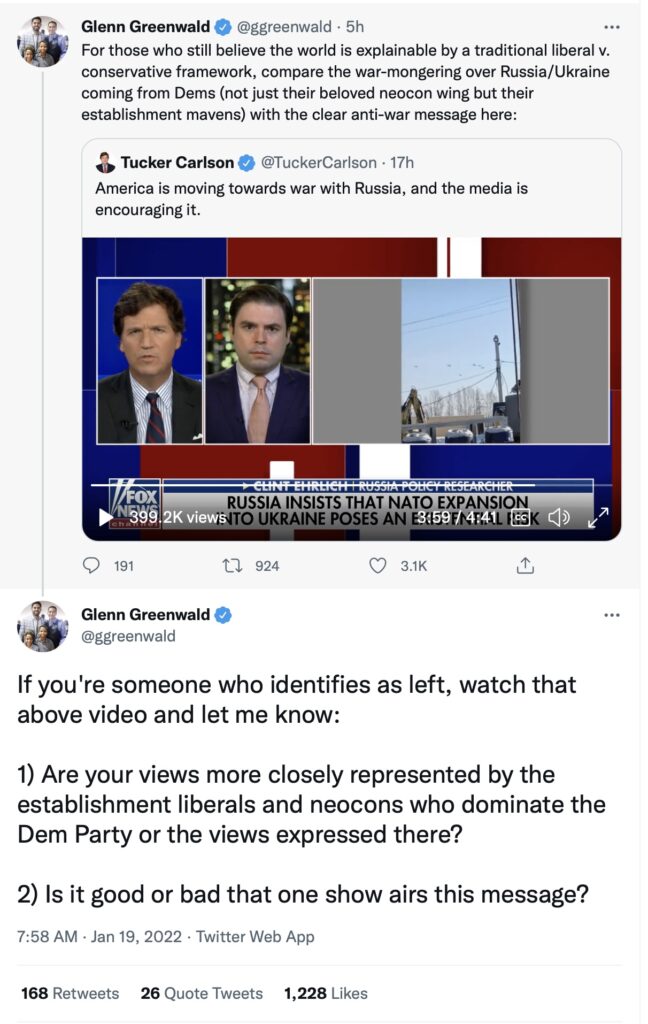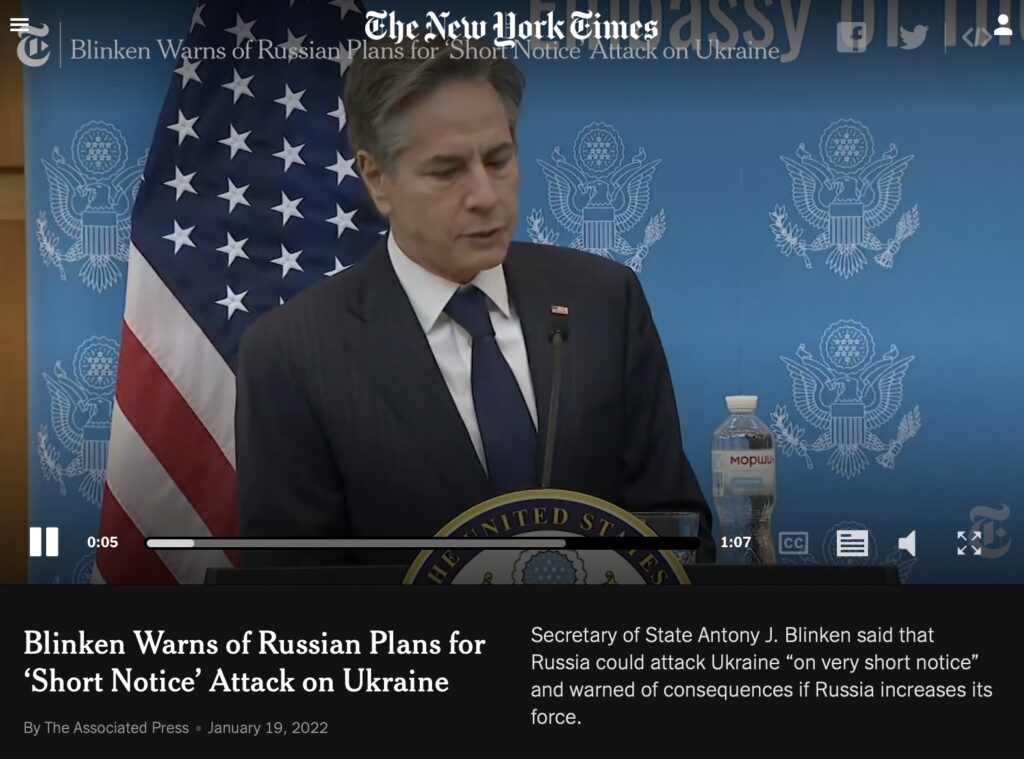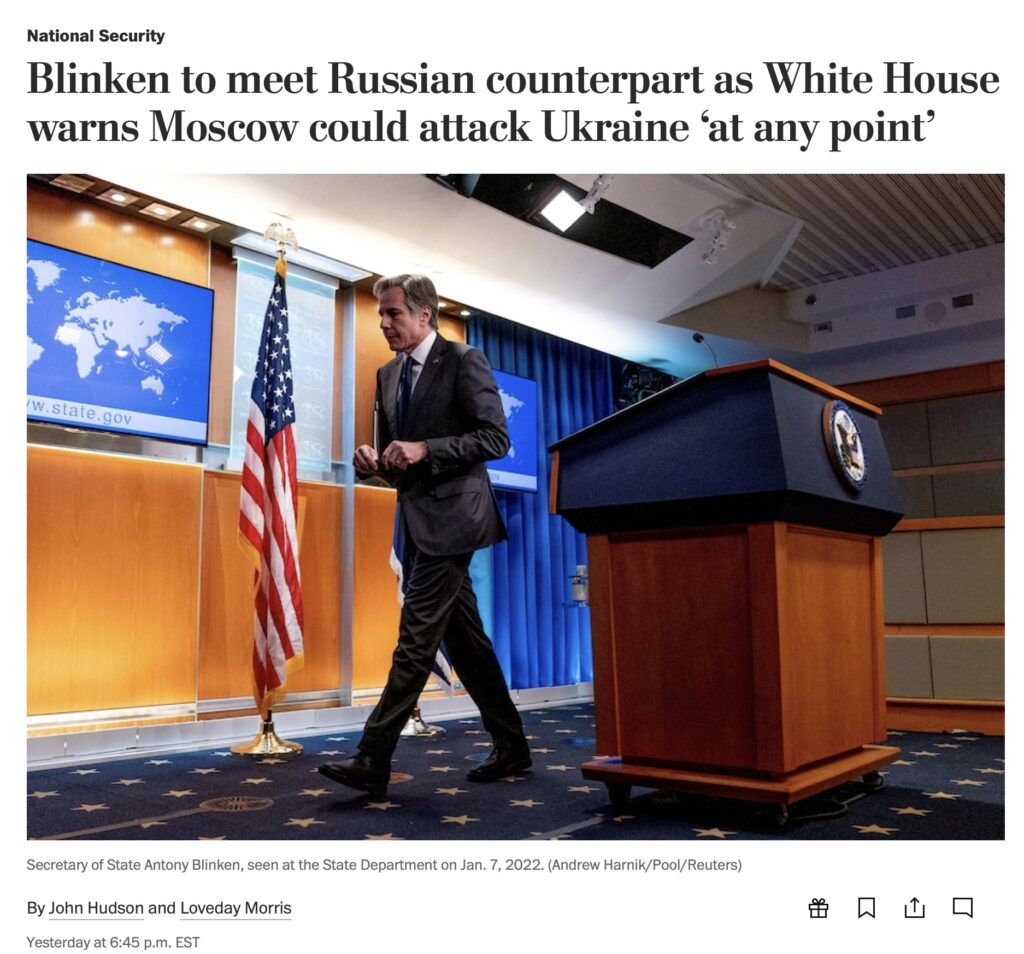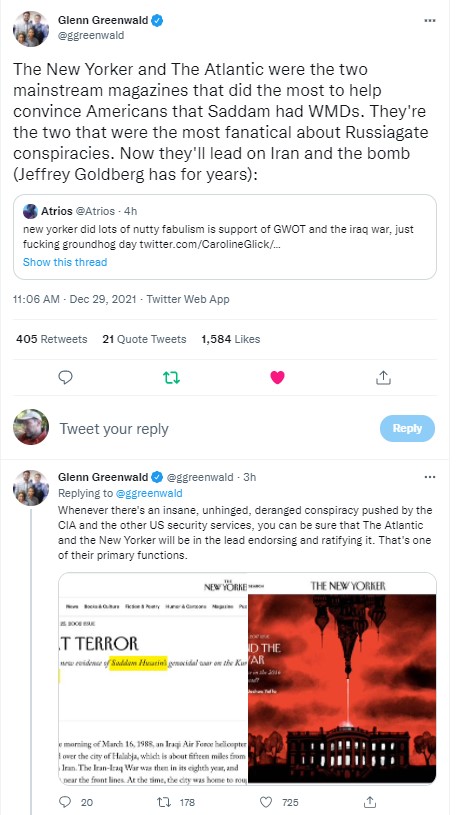I've given up on trusting anything that U.S. National Security Officials claim. It doesn't matter what administration and it doesn't matter what the particular topic is. They are paid to lie. The immediate collapse of Afghanistan comes to mind, mere days and weeks after Joe Biden told numerous lies about how stable Afghanistan's U.S. installed government was. . And that was after 20 years of lies by the U.S. government that the military had a meaningful measurable objective in Afghanistan. Matt Taibbi pointed this out recently,
This all goes on for so long that the lies become institutionalized, believed not only by press contracted to deliver the propaganda (CBS’s David Martin this weekend saying with a straight face, “Everybody is surprised by the speed of this collapse” was typical), but even by the bureaucrats who concocted the deceptions in the first place.
The look of genuine shock on the face of Tony Blinken this weekend as he jousted with Jake Tapper about Biden’s comments from July should tell people around the world something important about the United States: in addition to all the other things about us that are dangerous, we lack self-knowledge.
Even deep inside the machine of American power, where everyone paying even a modicum of attention over the last twenty years should have known Kabul would fall in a heartbeat, they still believe their own legends. Which means this will happen again, and probably sooner rather than later.
Taibbi has also pointed out the abject corruption and theft of U.S. tax dollars. Abby Martin hit the bullseye on this topic last year on YouTube. Where has the legacy media been for most of the past 20 years? When Afghanistan suddenly collapsed, contrary to the solemn assurances of Joe Biden, there was surprise and distress and accusation. But the evidence was plain to see all along, as Abby Martin discussed it in this 2020 Youtube video.
[BTW, if you are wondering why I didn't embed Abby Martin's video (published on Youtube in June 2020), I did that in one of my prior posts in July 2020. But it's no longer available to be shared that way by policy of Youtube. If you embed that one year old video, you get a message from Youtube that the video is "age-restricted."

What does "Age Restricted" mean? Click the Youtube link for "Learn More." You'll learn this:
Age-restricted content: Sometimes content doesn't violate our policies, but it may not be appropriate for viewers under 18. In these cases, we may place an age-restriction on the video. This policy applies to videos, video descriptions, custom thumbnails, live streams, and any other YouTube product or feature.
Reading further down, you will learn that Abby's video is not allowed to be shared by embedding because of one or more of these things: Child safety, Harmful or dangerous activities, including regulated substances and drugs, Nudity and sexually suggestive content, Violent or Graphic Content or Vulgar language. In other words serious historical documentaries are not able to be shared by embedding because these things? Missing from that list of reasons is the reason that Abby's documentary forcefully exposes government lies, but maybe it would be too damned cynical to write that. Maybe we don't want our citizens to know history anymore. Maybe it's time to ban embedding of videos showing the falsity of "weapons of mass destruction" in Iraq or Joe Biden's voting record on Iraq or Afghanistan.
OK, that's the end of this long side-journey.]
What else have we learned recently about our government officials lying national security? I'll spare you dozens and dozens of big lies over the past decade. Instead, let's take a look at the "good" president, Barack Obama and his Secretary of State, Hillary Clinton. Glenn Greenwald's sharp eyes noted something interesting in a book proudly and recently written by one of Obama's senior national security advisers, Ben Rhodes. Here's a few excerpts:
Ever since Edward Snowden received asylum from Russia in 2013, Obama officials have repeatedly maligned his motives and patriotism by citing his "choice” to take up residence there. It has long been clear that this narrative was a lie: Snowden, after meeting with journalists in Hong Kong, intended only to transit through Moscow and then Havana on his way to seek asylum in Latin America. He was purposely prevented from leaving Russia — trapped in the Moscow airport — by the very Obama officials who then cynically weaponized his presence there to imply he was a civil-liberties hypocrite for “choosing” to live in such a repressive country or, even worse, a Kremlin agent or Russian spy.
But now we have absolute, definitive proof that Snowden never intended to stay in Russia but was deliberately prevented from leaving by the same Obama officials who exploited the predicament which they created. The proof was supplied unintentionally in the memoir of one of Obama's senior national security advisers, Ben Rhodes, entitled The World as It Is: A Memoir of the Obama White House. It is hard to overstate how dispositively Rhodes’ own book proves that Obama officials generally, and Rhodes specifically, lied blatantly and cavalierly to the public about what happened: a level of sustained and conscious lying that can be explained only by sociopathy.
. . . While repeatedly emphasizing how traumatic the Snowden revelations were for the Obama administrations, Rhodes boasts of the crucial role he played in preventing Snowden from leaving Russia as the NSA whistleblower was desperately attempting to do so — exactly the opposite of what people like Rhodes and Hillary Clinton were telling the public about Snowden.
It is really beyond words how willing these people are to lie. . . . .
. . . Rhodes — who has spent years insinuating that Snowden is a Russian spy and traitor given his "choice” to flee to Russia — knew in real time that Snowden never planned to stay even one day in Russia. He had only flown to Moscow from Hong Kong with the intent to immediately fly from Moscow to Havana, and then on to either Ecuador or Bolivia to obtain asylum. Prior to landing in Moscow, Snowden and his representatives had secured a commitment from the Cuban government to allow him safe passage through Havana on his way to South America.
The only reason Snowden is in Russia is because of the actions of Rhodes and his fellow Obama officials to deliberately trap him there: first by invalidating his passport so that he could not board any international flights, and then by threatening the Cuban government that any chance for normalization with the U.S. would be permanently destroyed unless they withdrew their guarantee to Snowden of safe passage through Havana, which they then did. Here's Rhodes in his own words, boasting about what he regards as his success:
There was one other, more important signal. Around the time of our second meeting, Edward Snowden was stuck in the Moscow airport, trying to find someone who would take him in. Reportedly, he wanted to go to Venezuela, transiting through Havana, but I knew that if the Cubans aided Snowden, any rapprochement between our countries would prove impossible. I pulled Alejandro Castro aside and said I had a message that came from President Obama. I reminded him that the Cubans had said they wanted to give Obama “political space” so that he could take steps to improve relations. “If you take in Snowden,” I said, “that political space will be gone.” I never spoke to the Cubans about this issue again. A few days later, back in Washington, I woke up to a news report: “Former U.S. spy agency contractor Edward Snowden got stuck in the transit zone of a Moscow airport because Havana said it would not let him fly from Russia to Cuba, a Russian newspaper reported.” I took it as a message: The Cubans were serious about improving relations
Could this admission be any clearer?
A young woman recently asked me what a "press secretary" does at the White House. I bluntly said, "Lie for the President." That answer is a bit misleading, of course, because Presidents (and candidates like Hillary Clinton) do a hell of a lot of lying all by themselves.
If I'm sounding irredeemably cynical, that's how I'm feeling. I don't foresee the situation ever getting any better. We have a deeply entrenched system in which Presidents lie and "news media" frantically spinning those words in partisan ways. Day after day, decade after decade. From Gulf of Tonkin right up to today and beyond. We the People are flying blind.
That's the way it always is with American war. American wars come intertwined with a constant stream of big lies. That history of war/lies was made clear in the documentary, "War Made Easy."
Epilogue:
If only there were an industry of businesses that manufactured goods and services specifically geared to maintaining the peace. Then there would be a weighty lobby to counterbalance the military-industrial complex.






